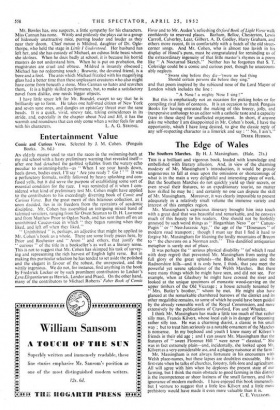Entertainment Value
AN elderly master used to start the races in the swimming-bath at my old school with a hasty preliminary warning that revealed itself— after one had detached the garbled syllables from the watery echo peculiar to swimming-baths—as " When I see your hands down, heels down, bodies erect, I'll say Are you ready ? Go ! ' " It was a perfunctory formula, swiftly followed by heavy splashing and con- fused yells, but it did serve the purpose of establishing some sort of essential condition for the race. I was reminded of it when I con- sidered what kind of preliminary test Mr. Cohen might have applied to the contributors to his exceedingly diverting book of Comic and Curious Verse. But the great merit of this hilarious collection, as I soon decided, lies in its freedom from the restraints of academic discipline. Mr. Cohen has assembled an intriguing mixed band of talented versifiers, ranging from Sir Owen Seaman to D. H. Lawrence and from Matthew Prior to Ogden Nash, and has sent them off on an uninhibited Caucus-race in which " they began running when they liked, and left off when they liked." " Uninhibited " is, perhaps, an adjective that might be applied to Mr. Cohen's book as a whole. There are some lively pieces here, by Prior and Rochester and " Anon " and others, that justify the " curious " of the title in a bookseller's as well as a literary sense. This is not to suggest that Mr. Cohen has skimped his task of survey- ing and representing the rich harvest of English light verse. But in making this particular selection he has tended to set aside the polished and the elegant in favour of the robust, the unexpected, and the wittily ingenious. We do not, for instance, find anything in the book by Frederick Locker or by such prominent contributors to Locker's Lyra Elegantiarum as Herrick, Landor and Praed. On the other hand, many of the contributors to Michael Roberts' Faber Book of Comic Verse and to Mr. Auden's refreshing Oxford Book of Light Verse walk confidently to reserved places. Barham, Belloc, Chesterton, Lewis Carroll, Calverley, Lear, Gilbert, A. D. Godley, Harry Graham, and others more recent, fit in comfortably with a batch of the old street- corner songs. And Mr. Cohen, who is almost too lavish in his display of Hood's puns, must be congratulated for reminding us of the extraordinary ingenuity of that little master's rhymes in a poem like " A Nocturnal Sketch." Neither has he forgotten that S. T. Coleridge could be a comic and curious poet, though he unaccount- ably neglects
" Swans sing before they die—'twere no bad thing Should certain persons die before they sing," and that poem inspired by the rubicund nose of the Lord Mayor of London which includes the line : " A Nose ! a mighty Nose I sing ! "
But this is emphatically not an occasion for picking holes or for compiling rival lists of contents. It is an occasion to thank Penguin Books for having entrusted the making of this breezy, jolly, and -inexpensive anthology to an editor with a catholic taste and a capacity (rare in these days) for unaffected enjoyment. In short, if anyone asks me whether I am disappointed in Mr. Cohen's book, I have the opportunity, which I have long desired, to give the classic reply of any self-respecting character in a limerick and say : " No, I ain't."
DEREK HUDSON.


































 Previous page
Previous page